Best Balance Bike for Toddlers Review
Balance bike for toddlers (aka. glider bikes): what is this type of bike exactly? It is essentially a small two-wheeler glider bike for children which allows them to push the bike along with their feet, and eventually, learn how to lift their feet up to glide along. Nevertheless, not all of these glider bikes are created equal and the available options are endless, that’s why today’s article will help you find the perfect bike for your tyke in a sinch!
Below is the list of the most popular balance bikes for kids for your consideration. After that, we will go deep into the top 5 balance bike models.
Best-Selling Balance Bikes Comparison Chart
| Rank | Image | Product | Price |
|---|---|---|---|
| 1 | Super Lightweight 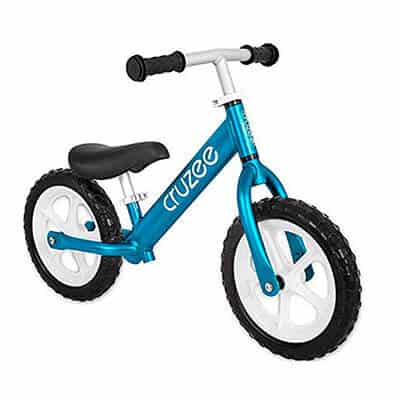 | Cruzee Ultralite Balance Bike
| Check Price |
| 2 | 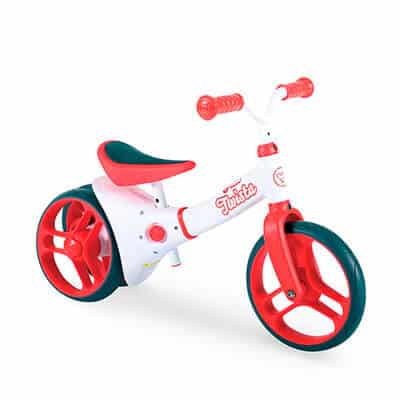 | Yvolution Baby Balance Bike
| Check Price |
| 3 | 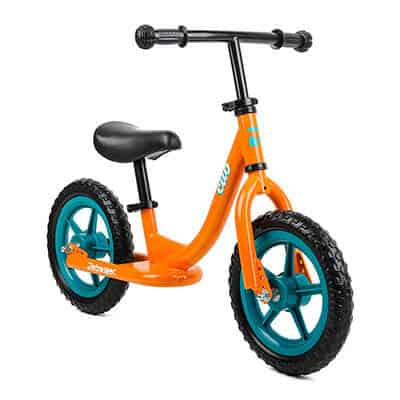 | Retrospec Cub Kids Balance Bike
| Check Price |
| 4 | Easy upgradable 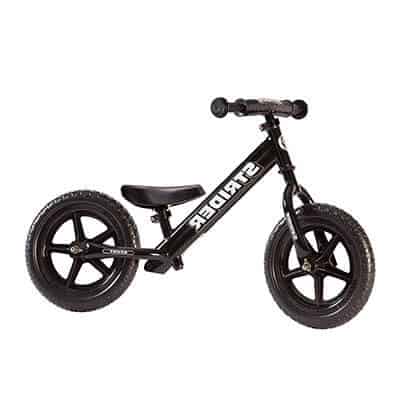 | Strider Sport Balance Bike
| Check Price |
| 5 | 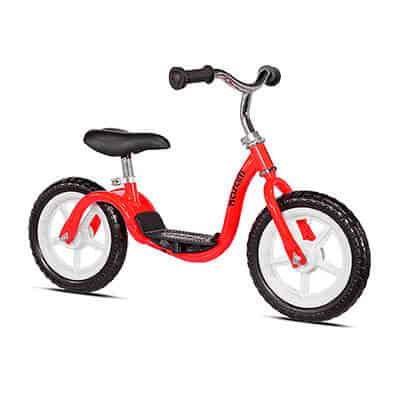 | KaZAM v2e Balance Bike
| Check Price |
| 6 | 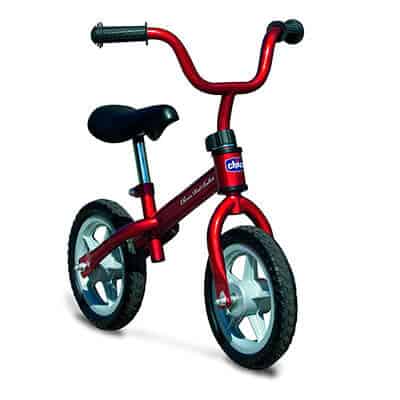 | Chicco Red Bullet Balance Bike
| Check Price |
| 7 | 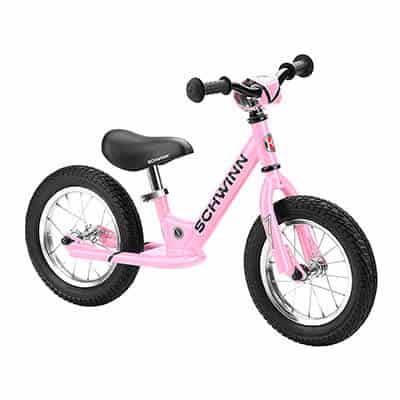 | Schwinn Balance Bike
| Check Price |
| 8 | Aluminum frame 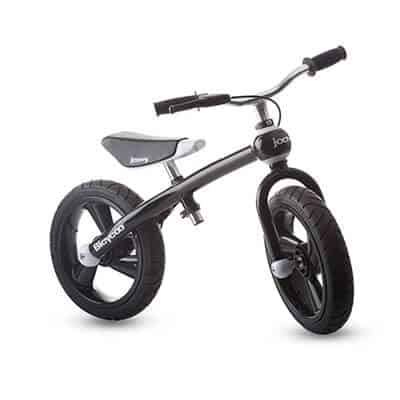 | Joovy Bicycoo Balance Bike
| Check Price |
| 9 | 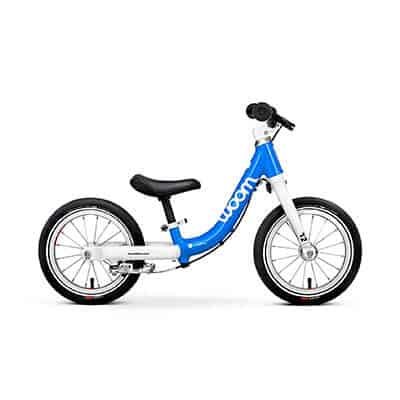 | Woom 1 Balance Bike
| Check Price |
| 10 | 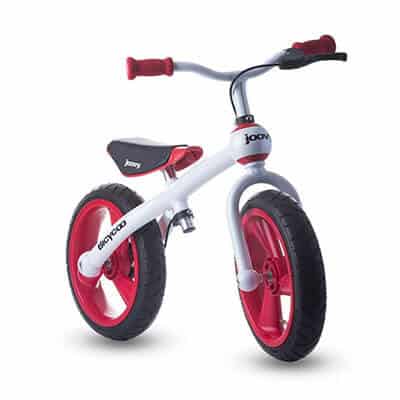 | Joovy Bicycoo Balance Bike Red
| Check Price |
| 11 | 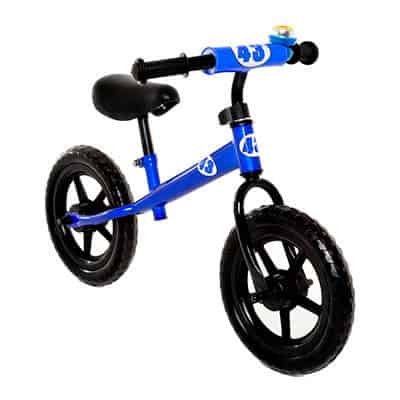 | Vilano Childrens Balance Bike
| Check Price |
| 12 | Unique design 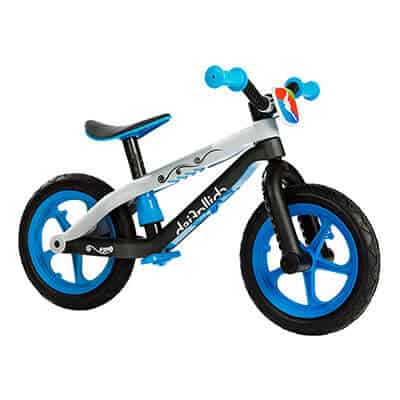 | Chillafish BMXie-RS Bike
| Check Price |
| 13 | 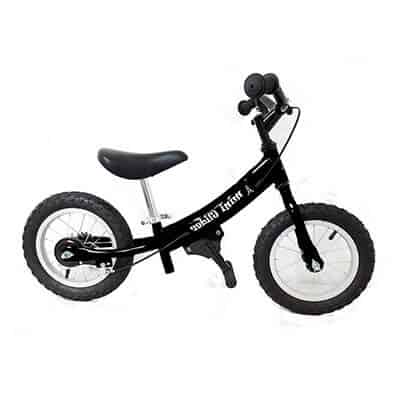 | Glide Bikes Mini Glider Balance Bike
| Check Price |
| 14 | 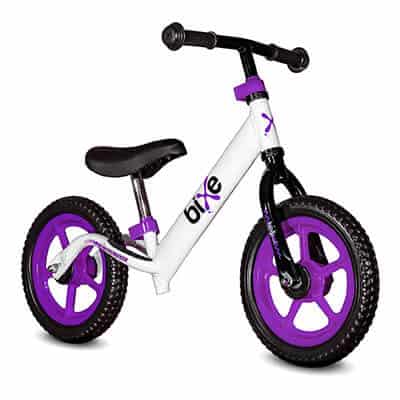 | Bixe Aluminum Balance Bike
| Check Price |
| 15 | 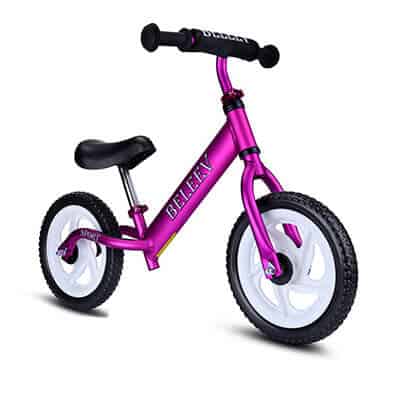 | BELEEV Balance Bike
| Check Price |
5 Glider Bikes Parents Choose the Most Often
Here is a brief overview of some of the best balanced bikes on the market and what they have to offer.
UltraLite Cruzee Balance Bike
Appropriate ages: 2-4 years
Features:
- Extra Comfortable Seat.
- Wide Color Selection.
- Foam Rubber Tires.
Twista Y Velo Balance Bike
Appropriate ages: 18 months to 3 years
Features:
- Innovative convertible wheel design.
- Shock-absorbing rubber wheels.
- Specifically designed for younger children.
Retrospec Cub Kids Balance Bike
Appropriate ages: 2 to 5 years
Features:
- Very durable steel frame.
- Heavier weight for extra stability.
- Foam tires for indoor and outdoor use.
12 Sport Strider Balance Bike
Appropriate ages: 18 months to 5 years
Features:
- Adjustable for different ages.
- Well-padded seat.
- Footrests for gliding.
KaZAM V2E Balance Bike
Appropriate ages: 3 to 5 years
Features:
- Lowered mid-bar for easy mounting.
- Footrest for gliding.
- No-air, pop-resistant tires.
5 Best Balance Bikes Review
1. The UltraLite by Cruzee
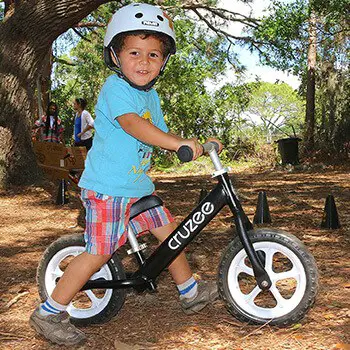 The Cruzee UltraLite is made from rust-free anodized aluminum for an extra-long lifespan. This makes the bike ideal for families who eventually pass the bike down to younger siblings. Another impressive aspect of this pedal-less bike is that the manufacturer provides a lifetime warranty.
The Cruzee UltraLite is made from rust-free anodized aluminum for an extra-long lifespan. This makes the bike ideal for families who eventually pass the bike down to younger siblings. Another impressive aspect of this pedal-less bike is that the manufacturer provides a lifetime warranty.
An extra-wide seat ensures a high level of comfort, and the seat and handlebars can be easily adjustable. There are 14 color combinations to choose from, so your child can have a bike in their favorite color. The tires are made from a type of foam rubber that makes them impossible to pop.
Perhaps one of the nicest features of this bike is that it is extremely lightweight, only weighing about 4.4 lbs. This makes the bike ideal for children who may have struggled with heavier bikes in the past.
What Other Consumers Are Saying About This Balanced Bike
- Ultra-lightweight design.
- High-quality materials.
- Very easy to adjust.
- Lifetime warranty
- In some instances, the handlebars may be difficult to properly tighten.
- The material of the tires makes an odd sound when it comes in contact with various surfaces.
- The tires lack traction.
2. Yvolution Baby Balance Bike
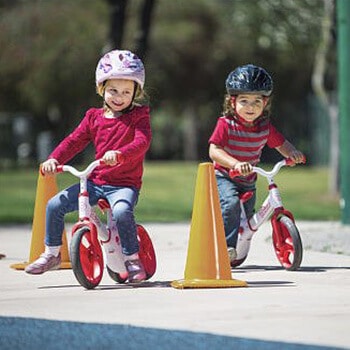
The Yvolution balance bike is a truly unique, thanks to its innovative wheel adjustment function. This function enables the wheels to move closer together or farther apart, which allows the bike to be customized in correlation to the child’s progress.
For younger riders, the two wheels in the back can separate from each other to provide to form more of a tricycle type of design, providing extra stability. Once the rider has become more confident and skilled on the bike, the wheels can close back together with a click of a button to form a true balance bike.
Like most other bikes of this kind, the seat and handlebars on this Velo model can be easily adjusted. However, while many other toddler bikes feature plastic wheels, this model incorporates shock-absorbing rubber wheels.
What Other Consumers Are Saying About This Bike
- A great option for toddlers who may be too small for other bikes.
- Innovative double rear wheel functionality.
- The bike’s functions grow with the child’s abilities.
- The innovative adjustment features cause this bike to be fairly heavy compared to other bikes, at 11.86 lbs.
- Some kids may quickly outgrow this bike.
- No footrests for gliding.
3. No-Pedal Bike by Retrospec
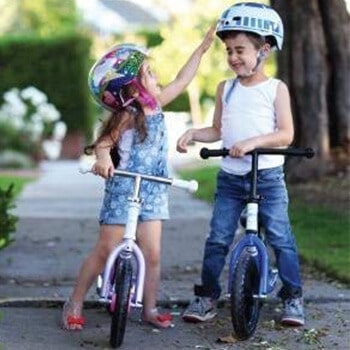 This Retrospec Cub Kids Balance Bike has been designed with a frame that allows for easy mounting. The bike is maintenance-free, as it features air-less tires and only requires minimal assembly. Appropriate age ranges for this bike are between 30 months and 5 years.
This Retrospec Cub Kids Balance Bike has been designed with a frame that allows for easy mounting. The bike is maintenance-free, as it features air-less tires and only requires minimal assembly. Appropriate age ranges for this bike are between 30 months and 5 years.
Easily adjustable seat and handlebar height allow the bike to be routinely customized as your child grows. The frame is made from high-tensile strength steel, which makes it super strong, and the tires are puncture-proof.
The manufacturer of this bike notes that this bike has been designed to be less likely to tip-over, which may be ideal for riders who have lacked confidence in other types of bikes.
One important thing to note about this bike is that it weighs 9 lbs, which is a bit heavier than most of the other bikes on this list. While this bit of extra weight likely adds to its stability, it may pose a handling problem for children who are on the smaller side.
What Other Consumers Are Saying About This Bike
Other customers have noted that the bike was super easy to assemble, as the frame comes with the tires already attached. Some issues that customers report with this bike are that the wheels may be squeaky in some cases, and the bike may be too heavy for younger riders.
- Assembly only takes about five minutes.
- Very durable, even after years of use.
- The 9 lb. weight makes it more stable.
- Very easy to adjust seats and handlebars.
- No handlebar brake.
- The 9 lb. weight makes it rather heavy for some riders.
- Some elements of this bike could be of a higher quality.
4. The 12 Sport Bike by Strider
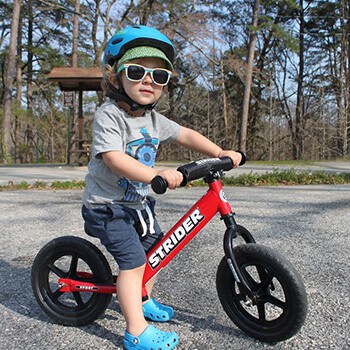 This Strider balance bike is intended for children between the ages of 18 months and 5 years, according to the manufacturer. The bike weighs about 6.7 lbs, so it is ideal for the younger age range that this bike supports.
This Strider balance bike is intended for children between the ages of 18 months and 5 years, according to the manufacturer. The bike weighs about 6.7 lbs, so it is ideal for the younger age range that this bike supports.
Additionally, this no peddle bike is known for its durability and puncture-proof tires, therefore, it may be a good choice for children who are on the rough-and-tough side. One of the special features of this bike is its well-padded seat, which enables children to remain on the bike comfortably for long periods of time.
The Strider 12 Sport has an adjustable seat height that extends to 19 inches and does not require any tools to adjust. Some assembly is required, however, the assembly process is relatively easy. As your child grows, the handlebars can be adjusted as well, and the bar grips have been designed small enough that they can fit comfortably in a toddler’s hand.
What Other Consumers Are Saying About This Bike
On the downside, customers have noted that in some instances, the wheels on their bike didn’t turn smoothly and may have needed to be oiled or exchanged. Other customers noted dissatisfaction with the fact that tires are not made of rubber.
- The high quality of this bike.
- It’s super lightweight makes it easy for a parent to carry if the child gets tired.
- Includes two different seats so parents can easily upgrade the bike as their child grows.
- The seat can be adjusted down low enough to be comfortable for a 2-year-old.
- The tires do not have much tread.
- Tires are not rubber.
5. The v2e by KaZAM
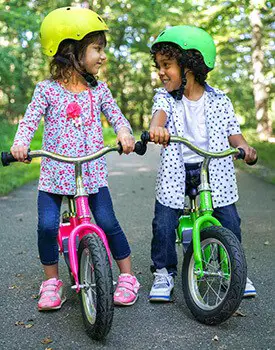 The KaZAM balance bike was a product featured on the well-known show ‘Shark Tank’! This bike is appropriate for children 3-5 years. The manufacturer advises that this bike is not suitable for children under the age of 3, due to small parts that pose a choking hazard. The total weight of this bike is around 8 lbs, which should make it rather effortless for most children to handle.
The KaZAM balance bike was a product featured on the well-known show ‘Shark Tank’! This bike is appropriate for children 3-5 years. The manufacturer advises that this bike is not suitable for children under the age of 3, due to small parts that pose a choking hazard. The total weight of this bike is around 8 lbs, which should make it rather effortless for most children to handle.
What makes this bike unique compared to the other bikes on this list is that it features a unique design that allows children to easily mount the bike. This feature also doubles as a footrest for costing, which serves to help children more effectively identify their center of gravity and prevent their feet from dragging on the ground.
If you are a parent who appreciates the convenience, you’ll likely be glad to know that this bike features special tires that never need to be refilled and are resistant to blowouts. The seat and handlebars can both be adjusted, with the seat easily raising and lowering between 13.5 and 16.5 inches and the handlebars raising and lowering between 19 and 20.5 inches.
What Other Consumers Are Saying About This Bike
- High-quality craftsmanship.
- A great option for children who may have had struggles learning to balance on other bikes.
- Highly affordable.
- Acceptable for children who are both short or tall for their age.
- Little wear and tear over time.
- The wheels are made of a thick plastic rather than rubber and may not grip as easily on some surfaces.
- In some instances, the handlebars may need to be loosened to make the bike easier to maneuver.
- Some assembly required.
Buyer’s Guide
Wondering why the balance bike is such a trending toy for the last few years? Ahhh, there’s nothing quite like the feeling of the open road, to be able to zoom across the land like a bird flying through the sky. The love of this feeling is something children and parents both enjoy, which is why wheeled toys have been popular among children for generations. And will probably continue to be popular for generations to come. Balance bike becomes even more popular than kick-scooters and other ride-on toys.
However, younger children can often feel left in the dust when they see older kids riding around on two-wheelers, while they are still stuck using their tricycle or training wheels. Not to mention, these ways of riding don’t really help the child learn the proper balance skills required to move up to a two-wheeler easily.

In this section, we will discuss some important information to know before purchasing this type of bike for a child:
Choosing the Right Toddler Balanced Bike
There are a large number of different balance bikes available on the market today–some that are highly regarded, while others are not so great. In general, the best bike for your child is the one that best accommodates their particular needs. Here are some things to keep in mind when choosing this type of bike for your toddler:
Bike Height
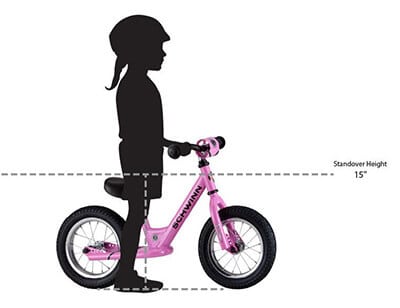 The child’s feet should be able to completely reach the ground with both feet. The best way to ensure this is to measure your child’s inseam and choose a bike with a seat height that fits this measurement. Keep in mind that most of these bikes are adjustable so you can raise or lower the seat as your child grows, or to share between children of different sizes.
The child’s feet should be able to completely reach the ground with both feet. The best way to ensure this is to measure your child’s inseam and choose a bike with a seat height that fits this measurement. Keep in mind that most of these bikes are adjustable so you can raise or lower the seat as your child grows, or to share between children of different sizes.
Bike Weight
- The weight of the bike is important because a bike that is too heavy could make it difficult for a child to handle and control. Additionally, a bike that is too heavy for your child will make it difficult for them to pick-up off the ground and mount. However, it should be noted that a heavier bike will also afford durability and dependability, which is something to keep in mind if your child is a bit more rough-n-tough, or feels timid about falling.
Child’s Age
- Generally speaking, these types of bikes are most suitable for children between the ages of 18 months and 5 years. However, some bikes work better for the younger vs. older end of this spectrum and vice versa. For younger kids, look for bikes that have a wider seat to help them feel more comfortable and secure on the bike, are lightweight for easy handling. They also have tires that can be used on indoor flooring without scratching, such as rubber or foam tires. For older children, look for a bike that has a strong, durable frame and unpoppable tires (usually made of high-quality plastic material) as these attributes will better support the weight of the child and the bike will last even when handled roughly.
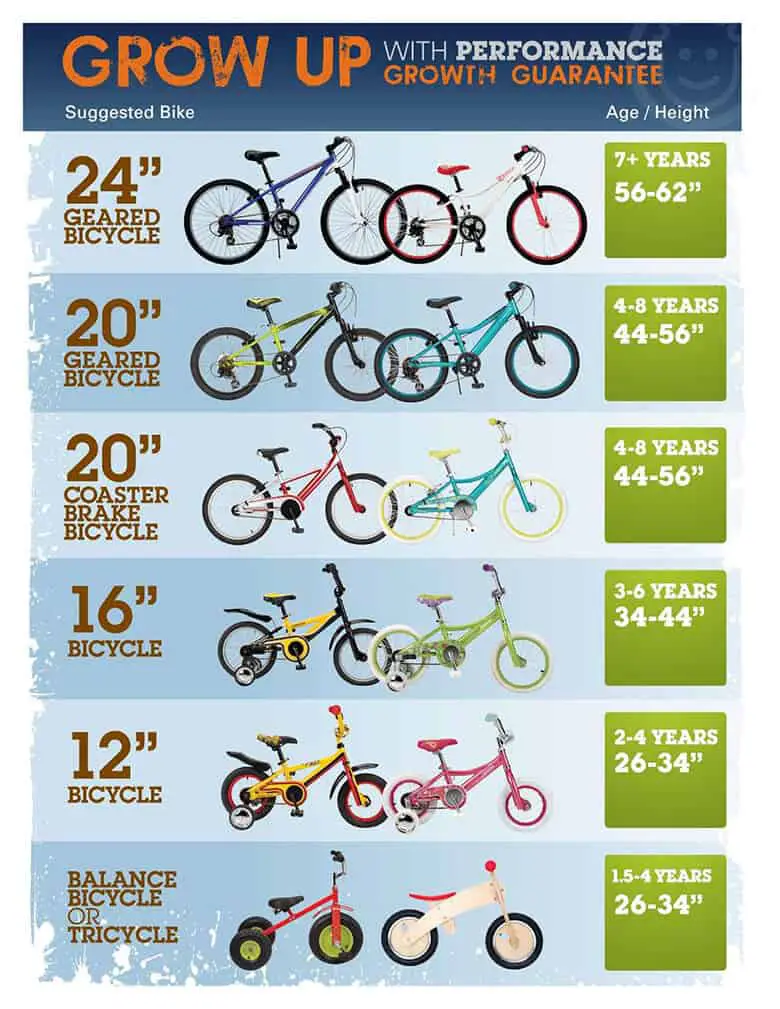
Child’s Abilities
- The child’s own abilities are an important factor in choosing the right bike. Some bikes (such as the Velo model shown above) come with enhanced features which make it easier for new riders to slowly adapt and learn balancing skills. Others feature footrests for more confident riders who know how to get a good glide going but have trouble keeping their feet off the ground.
Terrain
- Lastly, consider where your child will be primarily riding their bike. If you plan to let your toddler wheel the bike around the inside of the house, rubber or foam tires will be most ideal. A gravel driveway will require tires with good traction and are unpoppable. If the child will be riding in an area with a lot of downhill or sloping features, choose a bike with a handle brake so it’s easier for them to stop. These are just some key examples, but the key is to take note of the area around your home will the child will be riding and identify any features or qualities of the ground that may impact the bike performance on those surfaces. Then choose a bike with tires that would be most appropriate for those surfaces.
Balance Bike Benefits
So what’s all of the buzz about? And can balance bikes teach kids to ride better than bikes with training wheels? Let’s go through some of the attributes of these new to the market products.
Safety
Bikes with training wheels are apt to tip over and to fall, however, balance bikes are much more stable (even if they don’t have as many wheels!) Kids who learn on balance bikes are less likely to fall over once they get on a bigger bike, as they’ve honed their balance. Fewer falls are a big selling point for balance bikes.
Money-Saving
A balance bike lasts a child much longer than stair-stepped bikes with training wheels. Many families start their kids off with 12-inch bikes or tricycles before moving up through several sizes. A balance bike replaces two or three different bikes for most kids.
Another big point is that balance bikes tend to have a high resale value as compared to other kinds of bikes. Because they tend to be made of sturdy materials, balance bikes last the test of time as far as durability. Once a child has mastered their ride, parents can either pass the bike down to a sibling or sell it.
Design
Balance bikes tend to have sleek and modern designs and are often made of wood. Kids look great at riding these bikes, and the eye-pleasing design encourages kids to get out and ride. Without pedals to get caught in things, balance bikes are easy to transport. So they can be really easily thrown into the back of the car to head over to the park or to preschool.
A big problem with the design of training wheels is that getting them adjusted properly is a big challenge. Of course, that’s not a problem with balance bikes. Simplicity is again the key here!
Sooner Pedaling
Kids who ride balance bikes are more likely to learn to pedal independently than those kids who learn to ride a tricycle. For children who start on a balance bike, it’s not uncommon for them to master a pedal bike at age five or six, years before the average child. The transition to a pedal bike is also easier and less traumatic as the child isn’t accustomed to the stability and safety net of the tricycle pedals.
Part of the reason that this all works so well is that kids can start on a balance bike as soon as they’re walking – right around a year to eighteen months!
Training wheels prevent the bike from leaning over, which gives kids a false sense of what it’s like to sit on a bike. That false sense of security that comes from training wheels proves to be a big stumbling block for many kids, who then become afraid of riding a bike when the training wheels come off. Kids don’t feel safe and that causes a lot of worry for them, which for some kids can become a huge stumbling block. Balance bikes don’t ever instill a sense of stability, which means that kids aren’t afraid when it’s time to move to a big kid bike!
Models
There are so many models of balance bikes available out there on the market! Here we’ve mentioned the most popular designs. You’ll notice that there are tons of different options for everyone’s taste!
Balance bikes are becoming more and more popular every year. A whole generation of kids is learning to ride in a new (and old-fashioned) way.
How to Teach Your Child to Ride a Balance Bike
Conclusion
Of all the balance bikes for toddlers we presented here, the 12 Sportbike by Strider is our most favorite. We like this bike the best because it seems to have something for every rider, from younger to older. Because of this, the Strider provides the capability to truly last your child years, and to grow along with them, thus saving you the hassle from having to upgrade to a different bike as your child ages.
Younger riders will benefit from this bike’s smaller-sized handlebar grips and comfortable seat, while older riders will be able to ride rough thanks to the puncture-proof tires and durable frame. Additionally, 6-7 lbs. The weight of this bike makes it easy enough for a small child to handle, while still offering the strength and stability needed for older riders.





